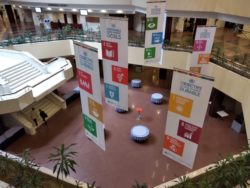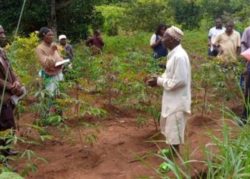Climate Change
Advising on Global Action
The climate emergency is the most formidable planetary challenge. In UKRI FLF research we are working with activist networks and the UK government to explore how we can accelerate social change in response to the climate crisis. Our researchers also have worked with key global actors including the UN, World Bank advising on climate change within the SDGs.
Normative change and climate action mobilisation
Viktoria Spaiser is working on a UKRI FLF on ‘Understanding Normative Change to Address the Climate Change Emergency’ (2021-2025 (+3) - £1,2m (+). Dr Spaiser and Nicole Nisbett are researching how we can accelerate social change (change in policies, institutions and behaviours) in response to the climate crisis – an absolutely top priority to address a fundamental challenge of our societies. As part of this research, they will investigate the effectiveness of new norms advanced by recent global climate protests, such as Fridays For Futures and how political psychology mechanisms can be harnessed for an empowering and adequate climate action mobilisation.
Climate change and the SDGs
 Within the Sustainable Development Goals (SDGs) UN Agenda, climate change is represented in the 13th Goal. However, how does the action on climate change goals interact with the other SDGs? Are there synergies or conflicts? And if pursuing the action on climate change goal clashes with the pursuit of other SDGs (e.g. economic growth – 8th SDG) are there ways to avoid the conflict? Spaiser et al. have published two papers on these questions using advanced mathematical modelling and cross-country time-series data and were subsequently invited to present their analysis approach and results at the UN workshop “Analytical tools for capacity building on quantitative methods for SDG interactions and integration in national development strategies and integrated planning” in Addis Ababa, Ethiopia in December 2019. Currently, Spaiser continuous to work on these questions with her PhD student Amir Emami (Data Analytics & Society CDT) in official collaboration with the World Bank.
Within the Sustainable Development Goals (SDGs) UN Agenda, climate change is represented in the 13th Goal. However, how does the action on climate change goals interact with the other SDGs? Are there synergies or conflicts? And if pursuing the action on climate change goal clashes with the pursuit of other SDGs (e.g. economic growth – 8th SDG) are there ways to avoid the conflict? Spaiser et al. have published two papers on these questions using advanced mathematical modelling and cross-country time-series data and were subsequently invited to present their analysis approach and results at the UN workshop “Analytical tools for capacity building on quantitative methods for SDG interactions and integration in national development strategies and integrated planning” in Addis Ababa, Ethiopia in December 2019. Currently, Spaiser continuous to work on these questions with her PhD student Amir Emami (Data Analytics & Society CDT) in official collaboration with the World Bank.
Spaiser et al 2016 SPAISER ET AL 2018
Strengthening National Action
In GCRF-funded research we work with governments in Malawi, Tanzania, Zambia and South Africa to strengthen national level climate action. Our research interrogates the political and social context of climate resilience policy making to inform our initiatives to make agriculture and food production more productive, sustainable and resilient to climate change.
Building government capacity

As part of the large interdisciplinary consortia GCRF-AFRICAP, we work with local organisations and governments in Malawi, South Africa, Tanzania and Zambia to create an evidence base to underpin new country specific policies in agriculture and food production as part of GCRF-AFRICAP.
Emma-Louise Anderson is collaborating with Laura Considine and Michael Chasukwa (Head of Politics and Administrative Studies, University of Malawi) to interrogate the multi-level, multifaceted power struggles and explore the role of trust in strengthening collaboration on climate policy making.
GCRF-AFRICAPIntegrating Local Perspectives, Knowledge and Information
Our research provides empirically-rich understandings of local perspectives and knowledge about climate change including work using participatory approaches.
Local information and women's adaptation in Kenya
Women are often on the frontline of climate change, as subsistence farmers, trying to feed their families and as lynchpins holding rural communities together. New insights and policy initiatives emanate from governments and scientists on how to mitigate the impacts of climate change, but does this key information actually reach the people who need it? And how easily can that information be put to use, alongside the knowledge they already hold, drawn from the day-to-day reality of dealing with these challenges?
We tackle these questions in QR-GCRF ‘Information ecosystems, gender, indigenous knowledge and climate change adaptation’ (£57k). Lata Narayanaswamy’s research with Chris Paterson (School of Media and Communication in Leeds), along with partners at the University of Nairobi and the LSE, provides nuanced understandings of how local information ecosystems in rural Kenyan communities operate and the effects on how women find and use information to support their climate change adaptation efforts.
Read moreOpening up marginalised perspectives through participatory video
Pierre Moorsom in his interdisciplinary PhD research project (supervised by Emma-Louise Anderson, Stephen Whitfield - Earth and Environment, and Tim Benton - Biology) sought to interrogate to what extent can participatory video contribute to reimagining development in Malawi. His research was designed to facilitate a genuine participatory process in which participants could take control reflect, deliberate, and holistically analyse their village’s social, agricultural and ecological realities with respect to climate change, identifying problems and proposing solutions. Following semi-structured interviews he undertook a five month participatory video (PV) process that culminated in the film, ‘Tigwirane Manja - Holding Hands’.
It has been shared in screenings with the local community, development practitioners in Malawi and researchers in the UK. Funded by the Leeds Anniversary Research Scholarship (LARS).
